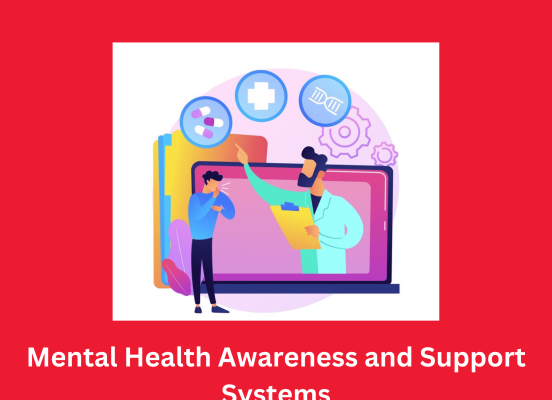
Mental Health Awareness and Support Systems
- By admin --
- Friday, 08 Mar, 2024
Mental health awareness and support systems have become increasingly vital topics in today's society, as individuals, communities, and governments recognize the importance of addressing mental health issues and promoting well-being. Mental health encompasses emotional, psychological, and social well-being, influencing how we think, feel, and behave. While mental health challenges affect millions of people worldwide, stigma, discrimination, and lack of access to resources often hinder individuals from seeking help and receiving adequate support. Therefore, fostering awareness, promoting understanding, and establishing robust support systems are essential steps towards building resilience and promoting mental well-being for all.
One of the fundamental aspects of mental health awareness is challenging the stigma and misconceptions surrounding mental illness. Stigma can lead to feelings of shame, isolation, and reluctance to seek help, perpetuating a cycle of suffering and silence. By promoting open dialogue, sharing personal experiences, and challenging stereotypes, we can create a culture of acceptance and understanding where individuals feel empowered to seek help without fear of judgment or discrimination.
Education plays a crucial role in raising awareness about mental health and equipping individuals with the knowledge and skills to recognize signs of distress, provide support, and access resources. Mental health literacy programs in schools, workplaces, and communities can teach people about common mental health conditions, coping strategies, and available support services, empowering them to take proactive steps towards self-care and seeking help when needed.
Moreover, destigmatizing mental health requires a concerted effort from various sectors of society, including the media, healthcare professionals, policymakers, and community leaders. Responsible media reporting can play a crucial role in shaping public perceptions of mental health by portraying accurate and empathetic depictions of mental illness and recovery. Healthcare professionals can promote destigmatization by providing compassionate care, advocating for mental health parity, and integrating mental health services into primary care settings.
In addition to awareness-raising efforts, establishing robust support systems is essential for ensuring that individuals facing mental health challenges receive timely and effective care. Access to mental health services, including counseling, therapy, and psychiatric care, is critical for individuals experiencing mental illness or distress. However, many barriers, such as cost, availability, and stigma, often prevent people from accessing the care they need.
Therefore, investing in mental health infrastructure and expanding access to affordable and culturally competent services is essential for closing the treatment gap and ensuring equitable access to care for all individuals. This includes increasing funding for mental health programs, integrating mental health services into primary care settings, and leveraging technology to deliver virtual counseling and telepsychiatry services, particularly in underserved areas.
Furthermore, peer support and community-based interventions play a vital role in complementing traditional mental health services and providing individuals with social support, validation, and encouragement on their recovery journey. Peer support groups, helplines, and online communities offer opportunities for individuals to connect with others who have shared experiences and offer mutual support and understanding.
Promoting mental well-being also involves addressing social determinants of mental health, such as poverty, inequality, discrimination, and trauma, which can exacerbate mental health challenges and contribute to disparities in access to care. Therefore, implementing policies that address social and economic inequalities, promote social inclusion, and foster supportive environments can have a significant impact on mental health outcomes at the population level.
Moreover, integrating mental health into broader public health initiatives, such as suicide prevention, substance abuse treatment, and violence prevention programs, can help address the complex interplay between mental health and other public health issues. By taking a holistic approach to mental health promotion and prevention, we can address underlying risk factors and promote resilience across the lifespan.
All in all, mental health should be thought of more inclusively. Instead of fearing, when society shuns the mentally ill, they should be reminded of their human potential which is limitless through education. This can only be achieved if we decide to stop self-stigmatizing and emphasizing stigma as an effect of social disorder rather than something else entirely. Thus, it is clear that eradicating mental illness prejudice requires an understanding awareness campaign that emphasizes positivity through knowledge dissemination rather than focusing on the negative aspects related to such people.





